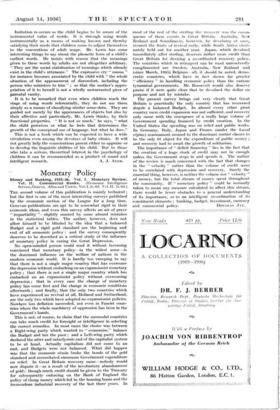Monetary Policy
THE second volume of this publication is mainly technical ; but the first is one of the most interesting surveys published by the economic section of the League for a long time. Genevan publications are apt to be somewhat rigid in their economic ideas, and even this survey affects an air of grave " impartiality "—slightly marred by some absurd mistakes in the statistical tables. The author, however, does not allow himself to be blinded by the idea that a balanced Budget and a rigid gold standard are the beginning and end of all economic policy : and the survey consequently deserves to be described as a critical study of the influence pf monetary policy in curing the Great Depression.
No open-minded person could read it without becoming convinced that monetary policy—in the widest sense—is the dominant influence on the welfare of nations in the modern economic world. It is hardly too sweeping to say that there is not a single major country that has overcome the depression without embarking on an expansionist monetary policy ; that there is not a single major country which has embarked on an expansionist policy without overcoming depression ; that in every ,case the change of monetary policy has come first and the change in economic conditions afterwards ;_ and finally, that the only two countries which have experienced no revival at all, Holland and Switzerland, are the only two which have adopted no expansionist policies. Nowhere has deflation succeeded, not even in Fascist coun- tries where the whole machinery of oppression has been in the Government's hands.
This is not, of course, to claim that the successful countries can take much credit for foresight or intelligence in selecting the correct remedies. In most cases the choice was between a Right-wing party which wanted to " economise," balance the Budget and tax the poor ; and a Left-wing party which declared the utter and cataclysmic end of the capitalist system to be at hand. Actually capitalism did not come to an end, and Budgets were not balanced. What did happen was that the economic strain broke the bonds of the gold standard and necessitated enormous Government expenditure on relief. In Great Britain recovery came—nobody would now dispute it—as a result of the involuntary abandonment ,of gold; though much credit should be given to the Treasury for subsequently enforcing on the Bank of England the policy of cheap money which led to the housing boom and the tremendous industrial recovery of the last three years. In most of the rest of the sterling bloc recovery was the conse- quence of these events in Great Britain. Australia, New Zealand and Scandinavia, however, by devaluing at once, secured the fruits of revival early, while South Africa obsti- nately held out for another year. Japan, which devalded immediately after sterling, deserves rather more credit than Great Britain for devising a co-ordinated recovery policy. The countries which in retrospect can be. most unreservedly complimented are Sweden, Australia, NeW Zealand and (since March, 1985) Belgium—all, it should be noted, demo- cratic countries, which have in fact shown far greater " efficiency " in handling economic policy than the various tyrannical governments. Mr. Roosevelt would also deserve ,praise if it were quite clear that he devalued the dollar on purpose and not by mistake.
The present survey brings out very clearly that Great . Britain is practically the only country that has recovered despite a balanced Budget. In almost every other great country mere credit expansion was not sufficient, and recovery only came with the emergence of a really large volume of Government spending financed by credit creation. In the United States the spending was on relief and public works. .In Germany, Italy, Japan and France (under the Laval regime) rearmament seemed to the dominant rentier classes to be the only fit object for the expenditure of public money ; and recovery had to await the growth of militarism.
The importance of " deficit financing " lies in the fact that the creation of a huge stock of credit may not be enough unless the Government steps in and spends it. The author of the review is much concerned with the fact that changes in. the " velocity " rather than the volume of credit seem to be correlated with depression and recovery. Surely the essential thing, however, is neither the volume nor " velocity " ,of money, but the total stream of money spent throughout the community. • If " monetary policy " could be normally taken to mean any measure calculated to affect this stream, .there would be fewer obstacles to a general understanding of its importance, or to an intelligent co-ordination of its constituent elements : banking, budget, investment, currency






































 Previous page
Previous page